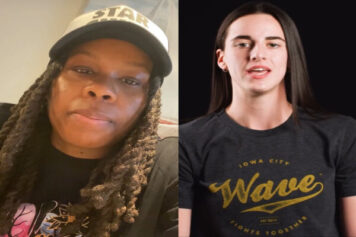As Lupita Nyong’o graced the stage clad in a beautiful, flowing sky blue Prada gown and accepted her Oscar for best supporting actress for her role as Patsey in the Oscar-winning film 12 Years a Slave, the entire media world posted photos of her gracious acceptance speech throughout the Internet. She was angelic, sincere, portraying the attributes of royalty. But it was a bit like déjà vu.
When we rewind to the year 2011 and witness actress/comedienne Monique walk to the stage to accept her best supporting actress win for her role as Mary Lee Johnston in Precious, we find that she too is adorned in a blue gown. Head back to 1940, when the very first African American Academy Award winner, Hattie McDaniel, won for best supporting actress in Gone with the Wind and you'll see that she wore blue too.

Hattie’s dress with gardenias in her hair was in fact Monique’s outfit 70 years later, picked in tribute to the pioneering actress. And those that subscribe to color psychology – the belief that colors can send a particular message or convey an idea to the observer – see a blue connection here.
Certain colors are said to effect mood, emotion and behavior. African Americans have sung about the blues for over a century now and the color is often associated with sadness and malaise in those songs. But the historic Oscar wins by Monique, Lupita and Hattie were anything but sad occasions. Color psychology says underlying themes were definitely communicated by the hue.
"The reason why I have on this royal blue dress is because it's the color that Hattie McDaniel wore in 1940 when she accepted her Oscar. The reason why I have this gardenia in my hair, it is the flower that Hattie McDaniel wore when she accepted her Oscar. So, for you, Ms. Hattie McDaniel, I feel you all over me, and it's about time that the world feels you all over them," said Monique in 2011.

"It's a blue that reminds me of Nairobi,” said Lupita, commenting on her chosen color for Sunday’s Oscar win. “And so I wanted to have a little bit of home."
But this is just a conspiracy theory, of course. Actress Octavia Spencer was draped in a spectacular Tadashi Shoji gown that could only be described as a pale cream when she won the Oscar for best supporting actress for her part as Minny in The Help. Whoopi Goldberg wore all black when awarded the best supporting actress Oscar in 1990 for her role in Ghost. And when the lovely Jennifer Hudson took the best supporting actress category for playing Effie in Dreamgirls (2006), she wore a red gown that fell across her physique like a breeze through the trees.
Whoopi's black gown could have projected negative feelings. However, according to this school of thought, black also projects power as well. In ancient Egypt, black represented life and rebirth.
While color psychology doesn't have a designation for pale cream, white is that of purity and innocence, while red is indicative of passion and fire. Blue is said to represent trust, peace, loyalty, and integrity.
When it comes to Hattie McDaniel these descriptive words are certainly on point. Monique communicated those ideas by proxy and in fact with her demeanor and gratitude upon receiving an Oscar in Hattie's honor. And although Nyong’o’s statement on wearing blue for her native African country are to the contrary, the color she wore was the same Hattie rocked 74 years prior, on nearly the same day as Lupita's win in the same category. And her words upon acceptance were representative of the ideas inherent in the integrity and peace represented by the shade of blue. “May this little golden statue remind you that no matter where you’re from,” she said, holding the Oscar tightly, tears flowing, out of breath, “your dreams are valid.”
Whether by accident or choice, the communicative powers of color were on display to the world during each of these historic, Academy Award shows. The nobility and graciousness Hattie, Monique, and Lupita exuded while adorned in blue were apparent as well. Making it seem as if blue is the new Oscar winning black.



